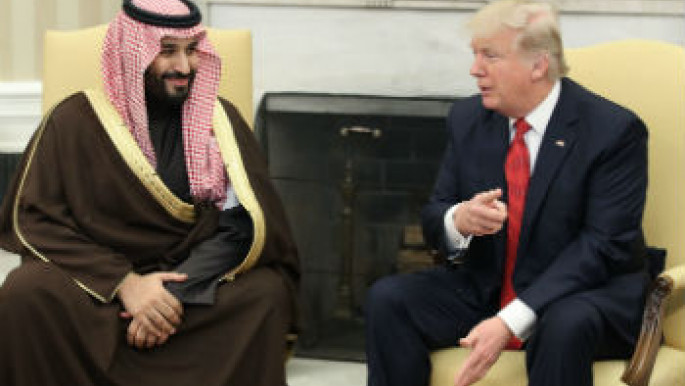Palestinian top negotiator Erekat reveals terms of Trump's 'Deal of the Century'
A scathing report criticising US President Donald Trump’s purported “Deal of the Century” to bring peace to Israel and Palestine, written by Palestinian official and veteran negotiator Saeb Erekat, has been seen by The New Arab.
In the report, Erekat lambasts the so-called “historic” deal, purported to propose a demilitariased and barely sovereign Palestinian state.
The deal, as Erekat understood it, would include a West Bank-Gaza corridor under Israeli control, allowing Palestinians restricted access to some of Israel’s port and airports and declaring the Jerusalem suburb of Abu Dis as the Palestinian capital, in return for Israel annexing settlement land in the West Bank and maintaining 'overriding security control' over this Palestinian state.
The Palestinian leadership has previously denied claims that Saudi Arabia’s Crown Prince Mohammed bin Salman had conveyed details of the Trump administration’s peace plan to the PLO in January.
The veteran negotiator’s report puts forward fifteen features he predicts Trump would offer in his final deal.
The first two conditions, already made public, are Israeli control over a “united Jerusalem”, meaning both East and West sides, and the creation of the Palestinian future capital in Abu Dis, an East Jerusalem suburb cut off to the holy city by the Israeli separation barrier.
The report also predicted that within two to three months, Trump will announce his consent to the annexation of a bloc comprising 10 to 15 percent of West Bank settlements.
 |
|
| Saudi's crown prince Mohamed bin Salman allegedly leaked the contents of Trump's deal to Palestinian officials [Getty] |
In regard to the security situation, Erekat contended that Trump wished to create a “shared notion of security” between the two countries, which would include a demilitarised Palestinian state with its own “powerful” police force, security cooperation with Jordan, Egypt and the US, the presence of Israeli forces along the Jordan Valley, while Israel would maintain “overriding security responsibility”, in case of “emergencies”.
It is also predicted that Trump’s deal would propose the withdrawal of Israeli forces from Area A and B, and some areas of Area C, in accordance with Palestinian "compliance" with the deal.
The deal would also enforce international and Palestinian recognition of Israel as a Jewish state.
According to Erekat, the deal will afford some, albeit limited, freedom of movement for Palestinians, including a secure corridor between the West Bank and Gaza, and access to some parts of the ports of Ashdod and Haifa, and Ben Gurion Airport.
Palestinians would also have access to international border crossings, however these would remain under Israeli control, as would territorial waters, airspace and the electromagnetic spectrum, which would cover mobile, radio and internet signals.
The report did not outline any specific terms in relation to Palestinian refugees, apart from Trump offering a “just” status for internally displaced Palestinians. It also predicted that a decision on the final border and the permanent status of the two states would be decided after the deal.
As well as providing a harsh critique of the predicted deal, Erekat’s report, allegedly already presented to President of the Palestinian Authority Mahmoud Abbas, presented a bleak vision of a future Palestinian state. He further warned that affording Trump more time before he presented his peace deal would equate to “total acceptance” of the deal, which promotes reinforced Israeli-US dominance in the region.
Twitter Post
|
Last week, Abbas shunned Trump’s peace efforts as the “slap of the century”, in a two-hour speech which saw him reiterate his refusal to allow the Trump administration as a mediator in peace talks with Israel, and called for an internationally-led process.
In the report, Erekat warned that anyone opposed to the deal will be shunned by the US as a terrorist or extremist, and that under Trump, the American definition of a "moderate" position on the conflict essentially equates to total assumption of the incumbent Israeli government’s stance, which encompasses policies of illegal settlements, land confiscation, housing demolition, forced expulsion, ethnic cleansing, assassinations, arrests, blockades and closures.
Erekat iterated that Trump’s recognition of Jerusalem as the capital of Israel marks the beginning of new chapter of American foreign policy, in which the US will impose its own dictates, in line with current Israeli policy, on Palestine and Palestinians.
The veteran negotiator made bleak predictions for the future of US-Palestinian relations, saying that their relationship could only be rectified if the Jerusalem decision was overturned.
Therefore, the Trump administration could be considered neither a mediator nor a sponsor of the peace process in any way, shape or form, recommending that the PA cut off any communication with the US on the peace process.
Statement are yet to be made from the Palestinian, Israeli or US governments in regard to Erekat’s report.





 Follow the Middle East's top stories in English at The New Arab on Google News
Follow the Middle East's top stories in English at The New Arab on Google News


